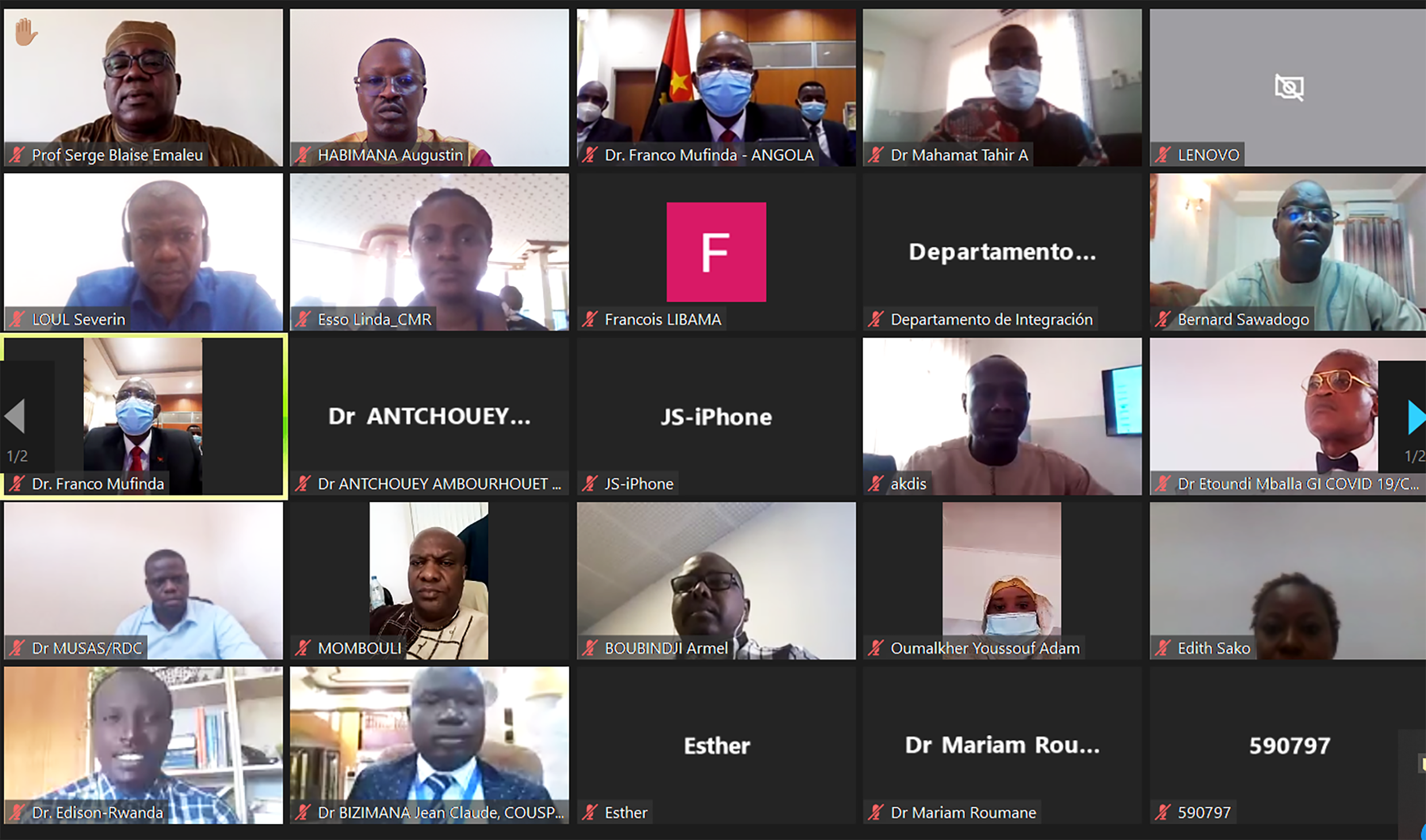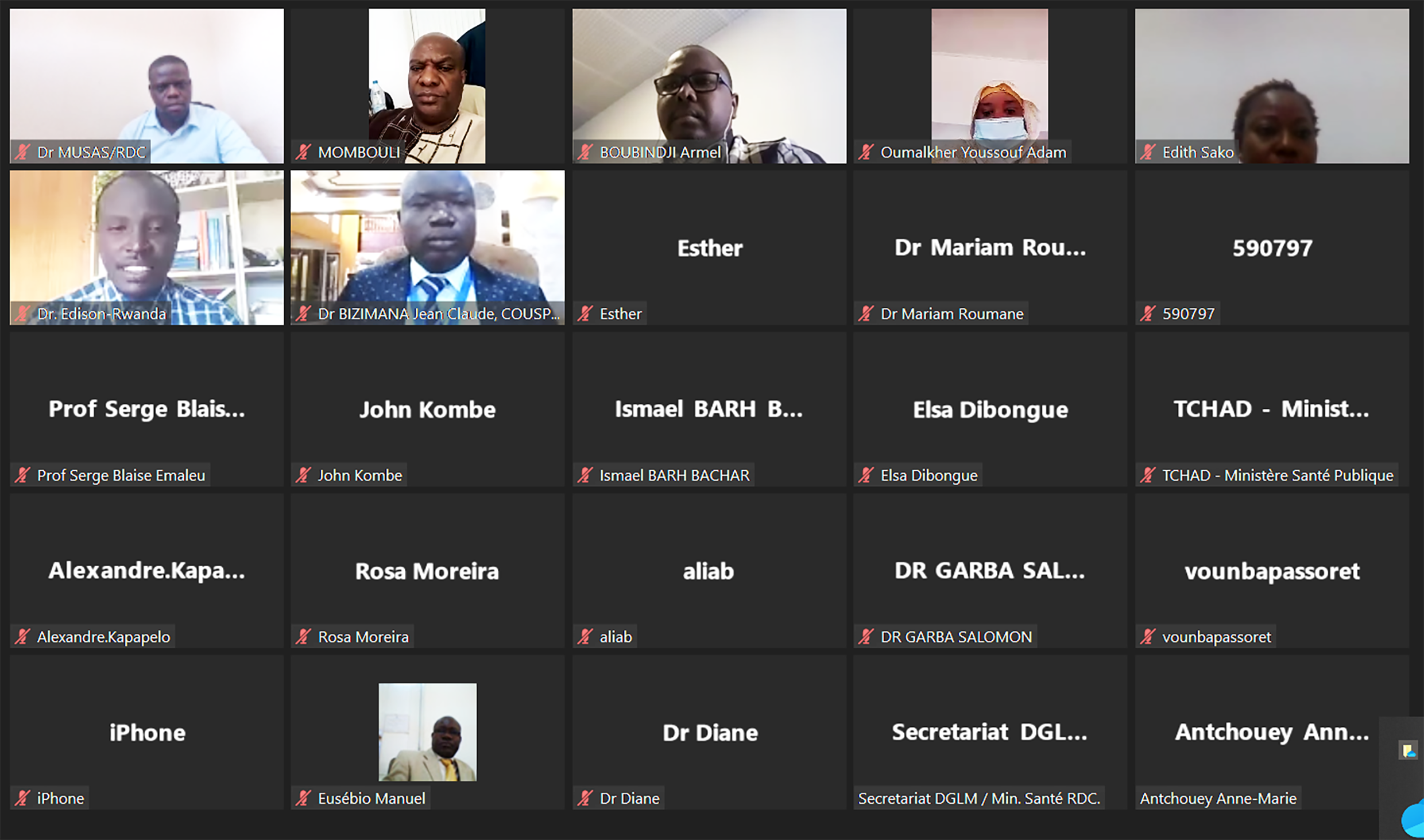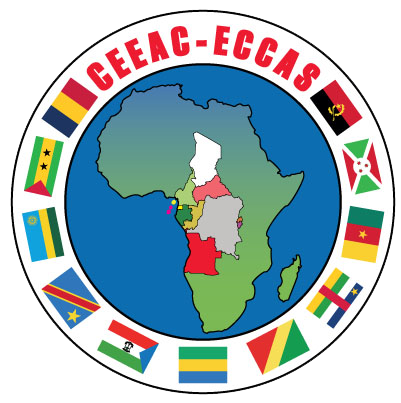EACC BRINGS TOGETHER EXPERTS FROM THE MINISTRIES OF HEALTH OF EACC MEMBER STATES TO DISCUSS THE ESTABLISHMENT OF PUBLIC HEALTH EMERGENCY OPERATION CENTRES (COUSP) AND GOOD PRACTICES FROM THE RESPONSE TO COVID-19

Libreville, 12 April 2022, The Economic Community of Central African States (ECCAS) Commission through the Regional Disease Surveillance Systems Strengthening Project in Central Africa (REDISSE IV) organised a meeting of experts from the Ministries of Health of its eleven (11) member states on Tuesday by video conference. The purpose of this meeting was to exchange on the level of implementation and functioning of the Public Health Emergency Operations Centres (PHECs) and to share lessons learned and good practices from the response to COVID-19.
The opening ceremony was marked by the reading of the introductory speech of Mrs. Yvette-Kapinga NGANDU, Commissioner in charge of the Department of Gender Promotion, Human and Social Development, by Prof. Serge Blaise Emaleu, Expert in charge of preparedness and response to health emergencies at the REDISSE IV/CEEAC Project.
In her opening remarks, she recalled that the H1N1 influenza pandemic (2009), the Ebola outbreak (2014-2020) and, currently, COVID-19, are ample reminders that our sub-region is not immune to the threat of emerging and re-emerging pathogens, thus causing an increased risk of health emergencies.
The Commissioner specified that in a globalised world where distances are increasingly easy to cross, infectious diseases are likely to spread faster than ever, thus posing a threat to the already very fragile health systems of our countries on the one hand. But also on the other hand on the local communities where they appear and develop rapidly due to lack of adequate preparation and effective early warning systems.
This was followed by presentations from Angola, Burundi, Rwanda, Cameroon, CAR, DRC, Gabon and Chad. At the end of which it emerged that some countries in the sub-region experience frequent epidemics of Ebola, cholera, measles, malaria, rabies, viral hepatitis, yellow fever, monkey pox, Rubella, measles, and more recently the COVID-19 pandemic, which has been added to the HIV/AIDS pandemic that is already hitting the populations of the sub-region so hard, in addition to tuberculosis and malaria.
It is clear from the various presentations that countries have responded to the ongoing pandemic in different ways, using different response mechanisms and with varying degrees of functionality, and that the Public Health Emergency Operations Centre as recommended by the World Health Organization (WHO), and the establishment of Incident Management Systems (IMS) have only been partially implemented in the majority of the countries of the sub-region, all or most of which require support, but also and above all by capitalising on the achievements of the more advanced countries in a spirit of South-South partnership. It was also noted that there is a deafening lack of a functional mechanism for cross-border communication and information exchange, hence the need for harmonisation via a regional structure, such as the Central African Health Organisation, which is currently being set up, to help and formalise the establishment of COUSPs in the countries, and to provide them with sufficient human and financial resources to enable them to play their leading role fully in the prevention, preparation and response to public health emergencies which may arise at any time.
Good practices shared by countries in the response to COVID19 include a) the use of new information technologies at all stages of the response: geo-location of cases for optimal contact tracing by some countries, the use of drones and robots; b) case finding; c) mass screening and point of entry controls; d) laboratory capacity building in all countries; etc.
To meet the challenges identified, the health experts from ECCAS member countries stressed the urgent need to strengthen the system of prevention, preparedness and response to health emergencies at the level of each country with regional support for the harmonisation of plans and policies. Certain activities need to be strengthened, including (a) the regular organisation of cross-border activities between ECCAS countries; (b) the establishment of a solid data-sharing system at the level of the sub-region; (c) the mobilisation of funds and an increase in the share of governments to finance the health sector d) the constitution of a permanent fund for public health emergencies; e) the continuous training of public health emergency personnel; f) the pooling of resources at the sub-regional level; g) the creation and strengthening of laboratory networks in the sub-region; etc.
It should be recalled that this meeting was organised as a follow-up to the commitments made by the world's governments in September 2005 at the launch of the Sustainable Development Goals (SDGs) to strengthen the capacity of all countries, particularly developing countries, in early warning, national and global risk reduction and health risk management (objective 3.12). More specifically, by 2027, the aim is to reduce the risk of major public health events and diseases with epidemic potential, including zoonoses, in at least 90% of health districts.
Central Africa, through the Congo Basin, is a reservoir of biological diversity and thus constitutes a nucleus for the emergence of infectious (zoonotic) diseases, the repercussions of which in the event of an outbreak are disastrous from a strictly health, economic, social and political point of view.
The opening ceremony was marked by the reading of the introductory speech of Mrs. Yvette-Kapinga NGANDU, Commissioner in charge of the Department of Gender Promotion, Human and Social Development, by Prof. Serge Blaise Emaleu, Expert in charge of preparedness and response to health emergencies at the REDISSE IV/CEEAC Project.
In her opening remarks, she recalled that the H1N1 influenza pandemic (2009), the Ebola outbreak (2014-2020) and, currently, COVID-19, are ample reminders that our sub-region is not immune to the threat of emerging and re-emerging pathogens, thus causing an increased risk of health emergencies.
The Commissioner specified that in a globalised world where distances are increasingly easy to cross, infectious diseases are likely to spread faster than ever, thus posing a threat to the already very fragile health systems of our countries on the one hand. But also on the other hand on the local communities where they appear and develop rapidly due to lack of adequate preparation and effective early warning systems.
This was followed by presentations from Angola, Burundi, Rwanda, Cameroon, CAR, DRC, Gabon and Chad. At the end of which it emerged that some countries in the sub-region experience frequent epidemics of Ebola, cholera, measles, malaria, rabies, viral hepatitis, yellow fever, monkey pox, Rubella, measles, and more recently the COVID-19 pandemic, which has been added to the HIV/AIDS pandemic that is already hitting the populations of the sub-region so hard, in addition to tuberculosis and malaria.
It is clear from the various presentations that countries have responded to the ongoing pandemic in different ways, using different response mechanisms and with varying degrees of functionality, and that the Public Health Emergency Operations Centre as recommended by the World Health Organization (WHO), and the establishment of Incident Management Systems (IMS) have only been partially implemented in the majority of the countries of the sub-region, all or most of which require support, but also and above all by capitalising on the achievements of the more advanced countries in a spirit of South-South partnership. It was also noted that there is a deafening lack of a functional mechanism for cross-border communication and information exchange, hence the need for harmonisation via a regional structure, such as the Central African Health Organisation, which is currently being set up, to help and formalise the establishment of COUSPs in the countries, and to provide them with sufficient human and financial resources to enable them to play their leading role fully in the prevention, preparation and response to public health emergencies which may arise at any time.

Participants to the meeting
As for the lessons learned, in general, the participants underlined the different factors that have been at the basis of the success of the response against COVID-19, namely a) political will, with the involvement of the country's high authorities; b) the multi-faceted composition of the emergency response teams; c) strengthening of community-based epidemiological surveillance; d) involvement of civil society, the private sector and the media; e) capacity building of health personnel at all levels; f) case management and infection control; g) strengthening of risk communication and community engagement; etc.
Good practices shared by countries in the response to COVID19 include a) the use of new information technologies at all stages of the response: geo-location of cases for optimal contact tracing by some countries, the use of drones and robots; b) case finding; c) mass screening and point of entry controls; d) laboratory capacity building in all countries; etc.
To meet the challenges identified, the health experts from ECCAS member countries stressed the urgent need to strengthen the system of prevention, preparedness and response to health emergencies at the level of each country with regional support for the harmonisation of plans and policies. Certain activities need to be strengthened, including (a) the regular organisation of cross-border activities between ECCAS countries; (b) the establishment of a solid data-sharing system at the level of the sub-region; (c) the mobilisation of funds and an increase in the share of governments to finance the health sector d) the constitution of a permanent fund for public health emergencies; e) the continuous training of public health emergency personnel; f) the pooling of resources at the sub-regional level; g) the creation and strengthening of laboratory networks in the sub-region; etc.
It should be recalled that this meeting was organised as a follow-up to the commitments made by the world's governments in September 2005 at the launch of the Sustainable Development Goals (SDGs) to strengthen the capacity of all countries, particularly developing countries, in early warning, national and global risk reduction and health risk management (objective 3.12). More specifically, by 2027, the aim is to reduce the risk of major public health events and diseases with epidemic potential, including zoonoses, in at least 90% of health districts.
Central Africa, through the Congo Basin, is a reservoir of biological diversity and thus constitutes a nucleus for the emergence of infectious (zoonotic) diseases, the repercussions of which in the event of an outbreak are disastrous from a strictly health, economic, social and political point of view.
Laissez un commentaire
Votre adresse de messagerie ne sera pas publiée. Les champs obligatoires sont indiqués avec *
















